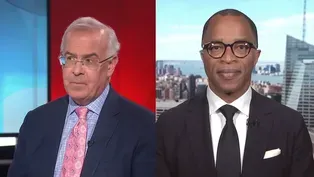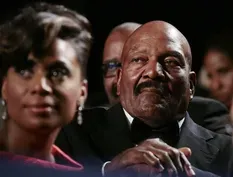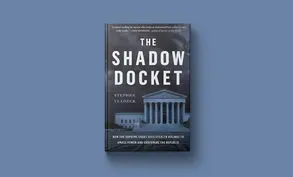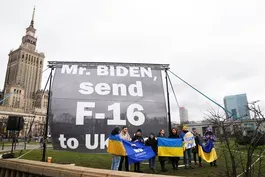
Syria welcomed back into Arab League after years of war
Clip: 5/19/2023 | 7m 27sVideo has Closed Captions
Syria and Assad regime welcomed back into Arab League after years of civil war
Twelve years ago, the people of Syria rose up against the regime of Bashar al-Assad as the Arab Spring uprisings swept the Middle East. Assad proceeded to kill, bomb, starve, poison and brutalize his people, and does still. He became an international pariah. Now, he is being welcomed back into the Arab League, a group that suspended Syria from its ranks in 2011. Stephanie Sy reports.
Problems with Closed Captions? Closed Captioning Feedback
Problems with Closed Captions? Closed Captioning Feedback
Major corporate funding for the PBS News Hour is provided by BDO, BNSF, Consumer Cellular, American Cruise Lines, and Raymond James. Funding for the PBS NewsHour Weekend is provided by...

Syria welcomed back into Arab League after years of war
Clip: 5/19/2023 | 7m 27sVideo has Closed Captions
Twelve years ago, the people of Syria rose up against the regime of Bashar al-Assad as the Arab Spring uprisings swept the Middle East. Assad proceeded to kill, bomb, starve, poison and brutalize his people, and does still. He became an international pariah. Now, he is being welcomed back into the Arab League, a group that suspended Syria from its ranks in 2011. Stephanie Sy reports.
Problems with Closed Captions? Closed Captioning Feedback
How to Watch PBS News Hour
PBS News Hour is available to stream on pbs.org and the free PBS App, available on iPhone, Apple TV, Android TV, Android smartphones, Amazon Fire TV, Amazon Fire Tablet, Roku, Samsung Smart TV, and Vizio.
Providing Support for PBS.org
Learn Moreabout PBS online sponsorshipGEOFF BENNETT: Ukrainian President Zelenskyy's surprise visit to the Arab League was not the only focus of that gathering today.
There was another attendee whose presence sparked outrage the world over.
Twelve years ago, the people of Syria rose up against the regime of Bashar al-Assad, as the Arab Spring uprising swept the Middle East.
Assad proceeded to kill, bomb, starve, poison, and brutalize his people, and does still.
He became an international pariah.
Now he's being welcomed back into the Arab League, a group that suspended Syria from its ranks back in 2011.
Stephanie Sy has the report.
STEPHANIE SY: With a warm hug and kiss, Syrian President Bashar al-Assad, an accused war criminal behind thousands of indiscriminate killings of his own people, strode back into the good graces of the Arab League, hand-in-hand with the Saudi Crown Prince Mohammed bin Salman.
Arab leaders posed with Assad, signaling the end of over 12 years of isolation within the region.
Assad called it a historic opportunity.
BASHAR AL-ASSAD, President of Syria (through translator): We need to treat the cracks that have emerged on the Arab scene during the past decade, for the Arab League should restore its role in healing wounds, not deepening them.
STEPHANIE SY: But Syrians in rebel-held territories have not forgotten their wounds and the tens of thousands of dead sisters and brothers, mothers and fathers, sons and daughters, all under the direction of Bashar al-Assad.
They continue to protest and fight.
Twelve years ago, pro-democracy voices rose up against the dictatorial Assad family's rule.
Among them was Wafa Mustafa's father.
WAFA MUSTAFA, Syrian Activist: My father was a businessman, but he was also very passionate about politics.
He dared to express his mind and say that the current situation in Syria is not good and it needs to change.
STEPHANIE SY: Her father, Ali Mustafa, is one of hundreds of Syrians that have been forcibly disappeared by Assad's regime.
WAFA MUSTAFA: We do not even know if he's still alive or not.
We do not know if he's -- what he's accused of, where he's held or anything.
STEPHANIE SY: The family fled Syria in 2013 and is split between Germany and Canada.
WAFA MUSTAFA: No justice, no accountability, no courthouses, no lawyers.
No one can do anything.
STEPHANIE SY: Omar Alshogre can testify to that.
Now a human rights activist he was jailed in 2012, in the early days of Assad's crackdown on dissent.
OMAR ALSHOGRE, Syrian Activist: They tortured me for years.
I was forced to be imprisoned.
I was forced to look at my fingernails when they were pulling them out.
I was forced to see my cousin dying in my arms.
I was forced to beat my cousin.
Otherwise, we both would be executed.
STEPHANIE SY: Documented torture, chemical attacks and incalculable destruction are the hallmarks of the Assad regime.
OMAR ALSHOGRE: How would you feel if a government kills your father, kills your brothers and destroy your hometown, your school, the places where you're supposed to have very beautiful memories?
That's what the Syrian regime did to me.
And when the Syrian regime is welcomed back to its seat in the Arab League, I feel like the entire world is betraying.
STEPHANIE SY: That sentiment resounds across the Syrian diaspora.
MOUAZ MOUSTAFA, Founder, Syrian Emergency Task Force: And it only reminds me of, like, the worst moments in our history.
I mean, imagine a time where anyone was willing to normalize with someone like Hitler or someone Milosevic.
STEPHANIE SY: Mouaz Moustafa is the founder of the Syrian Emergency Task Force, an organization that provides aid in Northwest Syria, which is rebel-held.
Some of these regional powers that have decided to normalize, including UAE, including Saudi Arabia, are U.S. allies.
Has -- have you seen the U.S. use its leverage in any way in these negotiations?
MOUAZ MOUSTAFA: Well, I have to say they have not been nearly as vocal and not public in their condemnation of any efforts at normalization or reintegration of the Assad regime.
STEPHANIE SY: Last week, U.S. Secretary of State Antony Blinken said the administration is against the readmission of Syria to the Arab League.
ANTONY BLINKEN, U.S. Secretary of State: They have to make -- make their own decisions.
And our position is clear.
We are not going to be in the business of normalizing relations with Assad and with that regime.
STEPHANIE SY: But Moustafa says the Biden administration is guilty of putting Syria on the back burner.
He is hopeful that the U.S. Congress will act.
His group helped author the Assad Anti-Normalization Act, which has bipartisan support.
MOUAZ MOUSTAFA: This legislation really holds responsible some of these Arab countries and will hold them accountable if they support the Assad regime and his crimes, as they normalize relations with him.
STEPHANIE SY: Moustafa's organization runs Tomorrow's Dawn, a women's center in school for Syrians displaced by the war.
RASHA ALSHAHAD, Director, Tomorrow's Dawn Women's Center (through translator): There is no family in the liberated area or what used to be liberated area that did not taste death or loss or fear for their children.
STEPHANIE SY: Rasha Alshahad is the center's director.
She feels betrayed.
RASHA ALSHAHAD (through translator): They welcome him as though nothing has happened.
The bigger blame is on the Arab people who did not vehemently disagree with what was happening, allowing it to happen.
STEPHANIE SY: For their part, Arab leaders have been on the path to normalization for years.
But Saudi Arabia was the key to letting Assad through the door.
Randa Slim of the Middle East Institute says: RANDA SLIM, Middle East Institute: The rapprochement with Syria is very much part of their detente with Iran.
STEPHANIE SY: Saudi Arabia recently restored ties with Iran after seven years of estrangement, and Slim says Saudi Arabia needs regional stability to meet its economic aims.
The move is also an acknowledgment that Assad is not going anywhere, and regional actors need him to address issues of refugees, counterterrorism, and a drug trade sanctioned by Damascus.
RANDA SLIM: The message from the Arab -- from these key Arab countries is that -- to the American administration and is also to the European -- is, OK, you have followed your strategy of sanctions, of isolation of the regime.
Well, it hasn't worked.
Let us try our way.
Let us try to see if we can offer some carrots to Assad to help on all these issues that concern you.
STEPHANIE SY: But Slim says Assad's comeback is limited.
Not all Arab countries have welcomed the move.
RANDA SLIM: It's really not significant.
Look, having a seat in the Arab League is -- is really not that powerful.
After all, it's not a powerful organization.
It's very much symbolic.
STEPHANIE SY: For others, including Wafa Mustafa, the readmittance of Assad is significant.
She now worries even more about her father's fate.
WAFA MUSTAFA: Such a step will only make things worse for Syrian refugees in neighboring countries, but also for Syrians inside Syria.
And, most importantly, it will kill any hope for people like me that our loved ones might be freed one day.
STEPHANIE SY: This July will mark 10 years since she last saw her beloved father.
For the "PBS NewsHour," I'm Stephanie Sy.
Brooks and Capehart on the debt ceiling negotiations
Video has Closed Captions
Clip: 5/19/2023 | 11m 1s | Brooks and Capehart on debt ceiling negotiations and Republicans joining the 2024 race (11m 1s)
Jim Brown's life and legacy as a football great and activist
Video has Closed Captions
Clip: 5/19/2023 | 7m 18s | A look at Jim Brown's life and legacy as a football great and activist (7m 18s)
Michael J. Fox tells his own story in new documentary
Video has Closed Captions
Clip: 5/19/2023 | 8m 26s | Michael J. Fox tells story of his career and living with Parkinson's in new documentary (8m 26s)
'Shadow Docket' explores Supreme Court's growing influence
Video has Closed Captions
Clip: 5/19/2023 | 6m 38s | New book 'Shadow Docket' explores Supreme Court's growing influence on American law (6m 38s)
U.S. will help train Ukrainian pilots on F-16 fighter jets
Video has Closed Captions
Clip: 5/19/2023 | 5m 52s | What the plan to provide F-16 fighter jets to Ukraine means for the war against Russia (5m 52s)
Providing Support for PBS.org
Learn Moreabout PBS online sponsorshipSupport for PBS provided by:
Major corporate funding for the PBS News Hour is provided by BDO, BNSF, Consumer Cellular, American Cruise Lines, and Raymond James. Funding for the PBS NewsHour Weekend is provided by...















